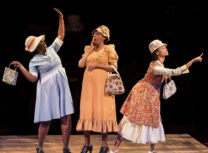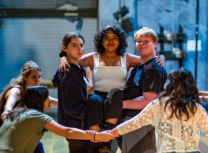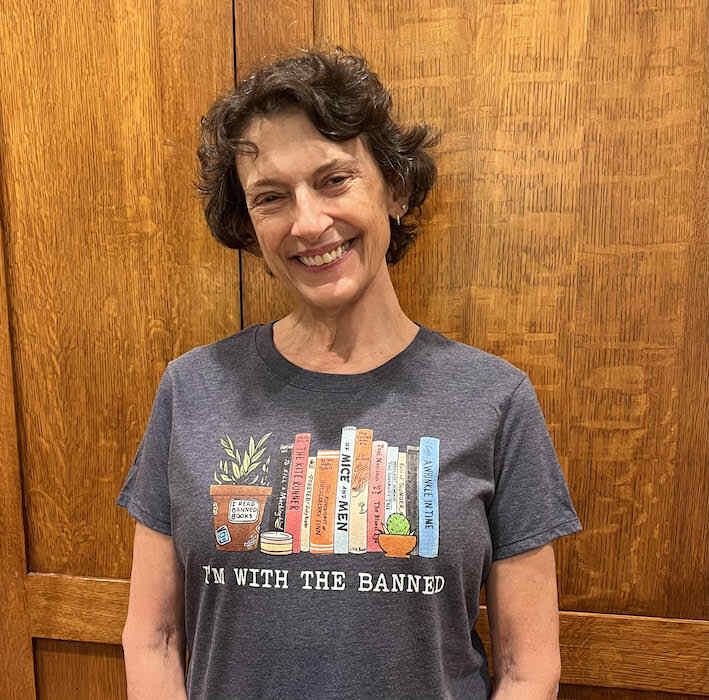Black History Month Feature: Nancy Cheryll Davis-Bellamy

By A Noise Within
February 25, 2021
Meet Nancy Cheryll Davis-Bellamy, Co-Founder and Artistic Producing Director of Towne Street Theatre, L.A.’s Premiere African-American Theatre Company. Discover what she calls her “creative evolution” from an actor to a director and a producer, as she brings under-recognized Black stories and characters to life on the stage.
How did you get started on your artistic journey?
I have loved the world of make believe and acting since I was very young. I did plays throughout elementary and high school and had a wonderful acting teacher in high school who made me believe I could do this for a living. I attended Western Michigan University for two years and then went to Boston, where I attended the Actors Workshop in Kenmore Square. I was planning to go to New York, but it was the coldest winter ever in 1978, so I decided to head west instead. I then attended the American Conservatory Theatre of San Francisco and came to Los Angeles in 1983. Although I loved the theatre, I wanted to pursue a film and television career.
How did you get to where you are now?
I have gone through what I like to call “a creative evolution”. I started as an actress, became a producer and then a director. One of the most enjoyable parts of acting I always loved was becoming part of an ensemble. It’s like magic, and I longed to always have that feeling, but as an actor you have to be cast first. I also found the waiting time frustrating and the roles in TV and film not substantial or fulfilling. As a young ingenue I played either a girlfriend or a prostitute. Even after being cast in the iconic Hollywood Shuffle, which gave my career a jumpstart, I did not receive the opportunities I wanted.
Though thankful for the work, I wanted more. In 1987, I was cast as one of the three witches in an all black production of Macbeth directed by Dominic Hoffman at the lovely Stages Theatre in Hollywood, and I found out that one of my fellow witches was having similar thoughts. At that point, Nancy Renee and I decided to form our own production company, A 2N Production. Its mission was to create opportunities for Black women and produce our own work. We began with readings of PJ Gibson’s all black female play, Long Time Since Yesterday. While it did not come to fruition as a production, as fate would have it, we would soon open our own theater.
After the 1992 riots in LA, the City asked how could the Arts Help Heal LA? We received a grant to produce a series of readings by playwrights of all ethnicities to show that no matter where you come from, we are all after the same human desires of belonging, love, family, and friends. When the city space we were using was overbooked for a reading, we did it in the downtown loft that I lived in with my then boyfriend who later became my husband, artist and photographer Nathaniel Bellamy. After 80 people showed up, we decided to create our own theatre space in the loft. The Towne Street Theatre opened in 1993 and 2N’s became 3 as Nathaniel became our Set, Lighting, Sound Designer/Producer, and of course Production Photographer. We all wore a lot of hats then and while not as many, 28 years later still wearing a few! Our mission is creating, developing, producing and presenting stories about African Americans and other stories with whom we share our history with.
During one of our productions, I was talking with one of the directors and she said, “I think it’s time you started directing.” I found I LOVED directing and was able to hone my skills at our theatre and then begin to receive professional opportunities as a director. As time went on, I found that I began to act less and produce and direct more. I realized that I love creating opportunities not only for myself, but for others through our productions at TST. Hence my “creative evolution”. I suggest to everyone that they explore the creative sparks within and don’t be afraid to see where that leads, even if it’s deviating from your original plan.
What challenges did you face on the way?
Starting anything new is challenging and opening a theatre in a film town on tiny budgets, even more so. One of our first obstacles was getting people to come Downtown to the theatre. This was the time period in Los Angeles long before the gentrification began, and Downtown LA was thought of as a scary place to come. We hired a security guard, we had elevator operators, we walked people to their cars, etc. Eventually the old adage of “if you build it they will come” began to take place. People began to recognize the good work we were doing and the fact that it was African-American stories being produced gave us a unique aspect. In 2000, the building was sold and we started producing around town. It was a bit of a shock for us not to have 24/7 access to a space like we had previously, so that was an adjustment on our part. In 2004, we landed at the Stella Adler Theatre in Hollywood and have been in residence there since.
Having enough money is always a challenge no matter what the year is, but we were determined to carry on no matter what. Thankfully, we had a team of dedicated artists who felt the same way, and many of them are still with us, along with the new ones who come into the fold, thereby giving us the longevity that we acquired.
The other challenge is living in a culture where celebrity is seen as validation of one’s existence. This is something we have never believed in and may have, to some degree, suffered for it. We always felt we needed to recognize people who weren’t being recognized or done ad nauseum; that is why we focused on original plays or Black classics that were seldom done. Also, being a theatre of color is an obstacle to achieving the standard rate of success we know we deserve. Until this moment in time, Black theatre has never been high on the radar of critics or other white standard bearers of theatre. Our work has been overlooked many times when it was excellent and certainly comparable to other work being put on. However, that again was not a determent for us. My goal has always been to serve the audiences, because their opinion is the only one that really matters.
How did you find and end up at ANW?
I have been aware of ANW since its beginnings. Some of my friends from ACT had worked there and Julia and Geoff were also ACT alum, although I did not meet them personally until last year. Jonathan reached out to me about Noise Now and asked if we would like present something. We did a reading of Concrete Rose, by member playwright LaDarrion Williams in August 2019. The play is about Hurricane Katrina. Ironically, we planned to present it as full production at TST in October 2020 as it was the 15th anniversary of Hurricane Katrina, but the pandemic had other plans.
How does your culture, family background, and history influence your work?
I grew up as the youngest of five in a small town in Michigan called River Rouge, which is right outside Detroit. My family is very proud of our heritage, loving, lively, and they always have been incredibly supportive of my work. Being the youngest I am sure was part of that. My family, like many Black families, is comprised of Black and White family members and recently Brown members as well. The town I grew up in was by contrast, very segregated, the Black people lived on one side of the tracks and the White people on the other. We all went to segregated elementary schools but all attended high school together. To a large extent it is still this way, although some progress has been made in terms of people living on either side of the tracks.
Growing up in this environment has influenced my work greatly. Life was truly Black and White, and race remained at the forefront. I was very aware of our history as African Americans in this country but also very disappointed I didn’t see myself or our stories in the movies or television. There was no theatre other then the high school plays I went to or was in. I thought then, as I do now all these years later, there’s so MANY stories and people that have never been given their moment. I want to continue to be the person who brings those stories to life.
Out of all your accomplishments in the arts, what are you most proud of?
I most proud of two things – one, co-founding Towne Street and keeping it going and growing for 28 years and being able to give opportunity to so many writers, directors, actors, designers, students, and audiences.
The other is my determination and dedication to bring to life Nella Larsen’s 1929 novella Passing. I read the book when I was at ACT and fell in love with the story of the friendship of two women who, while both were Black, could pass for White. As a very fair skinned African American many mistake for being White, this book spoke volumes to me, and I loved the period. I mentioned it to everyone I knew that it would be a great film. Nancy Renee and I asked one of our members, Harriet Dickey, to write a screenplay which we shopped around in the 1980s with my dream cast list of myself, Lonette McKee, and Denzel Washington. The film never came to fruition for us, but when we opened the theatre, a writer friend suggested we make it a play instead. It became our signature piece of work, winning a number of NAACP awards (one for myself for best actress) and we did it four times (1997, 1999, 1998, and 2004) because people kept asking for it. In 2007, I was asked to turn the play into a one woman show, which presented a new challenge. How do you take what had become a 14-character play and make it one person? But I did it, and with wonderful collaboration from Nancy Renee, Nathaniel and Tony Robinson, PassingSOLO premiered at the University of Iowa, then was presented at Northwestern, where E. Patrick Johnson became a mentor of mine, and it was published in the anthology Solo/Black/Woman by Northwestern University Press. In 2016, it was performed at Stella Adler before traveling to Germany and the University of Duisburg and became part of their syllabus as well at Stanford and University of California, Santa Barbara.
Although I couldn’t personally get the movie made, it was adapted recently by director/writer Rebecca Hall, who read the book at around the same age I was when I read it. It premiered this year at Sundance. So it gives me great satisfaction to see Nella Larsen’s legacy live on and know that the potential I saw in the book all those years ago was seen by someone else.
Who is your favorite Black author/playwright/artist? What is your favorite work of theirs?
Such a hard question as there are many who I love, (Zora Neal Hurston, Lorraine Hansberry, Katori Hall, Lynn Nottage), but will say the body of PJ Gibson’s work stands out for me, in particular her play, Long Time Since Yesterday. One of my long term goals is for us to do a year of her plays.
Learn more about Towne Street Theatre and support Nancy Cheryll Davis-Bellamy’s work here.








